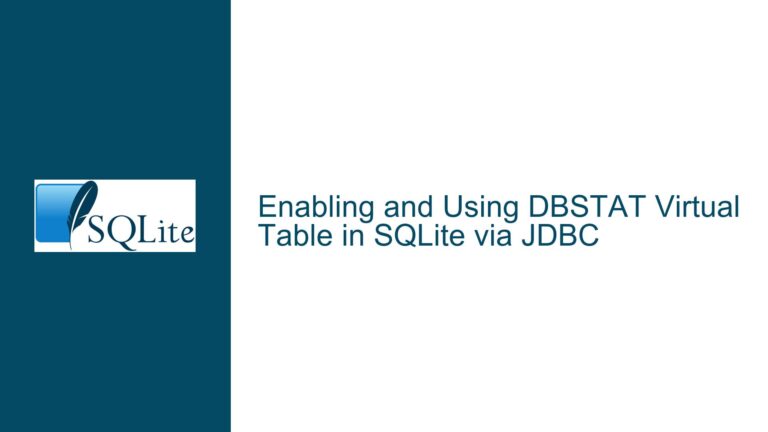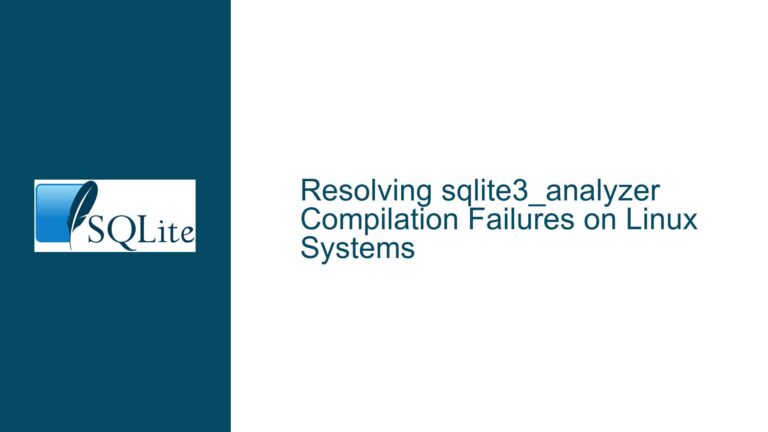SQLite SQLITE_OPEN_EXCLUSIVE Flag Handling and Race Conditions
Issue Overview: SQLITE_OPEN_EXCLUSIVE Flag Behavior and Race Conditions in Database Creation
The core issue revolves around the behavior of the SQLITE_OPEN_EXCLUSIVE flag in SQLite, specifically when used with the sqlite3_open_v2() function. The flag is intended to ensure that a database file is created only if it does not already exist, mimicking the behavior of the POSIX O_EXCL flag. However, SQLite silently filters out the SQLITE_OPEN_EXCLUSIVE flag when passed to sqlite3_open_v2(), which prevents developers from leveraging this functionality to avoid race conditions during database creation.
A race condition occurs when multiple processes or threads attempt to create a database file simultaneously. Without the SQLITE_OPEN_EXCLUSIVE flag, there is no atomic way to ensure that only one process successfully creates the database file. This can lead to scenarios where multiple processes believe they have created the database, resulting in redundant or conflicting initialization operations.
The issue is particularly relevant in multi-platform applications where developers need a consistent and reliable way to create databases without relying on platform-specific workarounds. While the race condition is rare, its potential impact on data integrity and application behavior makes it a significant concern for developers who prioritize robustness and security.
Possible Causes: Why SQLITE_OPEN_EXCLUSIVE is Filtered and Its Implications
The filtering of the SQLITE_OPEN_EXCLUSIVE flag in sqlite3_open_v2() is not a bug but rather a design decision. According to the SQLite documentation, the SQLITE_OPEN_EXCLUSIVE flag is intended for internal use within the Virtual File System (VFS) layer and is not meant to be exposed to application-level code. This design choice is reflected in the source code, where the flag is explicitly masked out during the sqlite3_open_v2() call.
One possible reason for this design is to maintain simplicity and consistency across different platforms. SQLite is designed to be a lightweight, cross-platform database engine, and exposing low-level file system flags like SQLITE_OPEN_EXCLUSIVE could introduce platform-specific complexities. For example, the behavior of O_EXCL on Unix-like systems differs from how file creation is handled on Windows, and accommodating these differences could complicate the codebase.
Another factor is the lack of a compelling use case for exposing the SQLITE_OPEN_EXCLUSIVE flag at the application level. The SQLite developers have argued that the race condition it aims to prevent is rare and can be mitigated through other means, such as using transactions or application-level checks. However, this reasoning overlooks the broader principle of providing developers with tools to write correct and robust code, even for edge cases.
The absence of proper documentation on this behavior further exacerbates the issue. While the SQLITE_OPEN_EXCLUSIVE flag is marked as "VFS only" in the documentation, this hint is easy to miss, leading to confusion and frustration among developers who expect the flag to behave similarly to O_EXCL.
Troubleshooting Steps, Solutions & Fixes: Addressing the Race Condition and Workarounds
While the SQLite developers have not yet implemented a native solution for the SQLITE_OPEN_EXCLUSIVE flag in sqlite3_open_v2(), there are several strategies developers can use to mitigate the race condition and achieve the desired behavior.
1. Use Transactions for Atomic Initialization
One effective way to handle race conditions during database creation is to use SQLite’s transaction mechanism. By wrapping the database initialization logic in a transaction, developers can ensure that only one process successfully creates and initializes the database. Here’s how this approach works:
- Open the database with
SQLITE_OPEN_READWRITE | SQLITE_OPEN_CREATE. - Begin an immediate transaction using
BEGIN IMMEDIATE. - Check if the database is empty by querying the
sqlite_mastertable. - If the database is empty, perform the initialization (e.g., creating tables, inserting initial data).
- Commit the transaction.
If multiple processes attempt this sequence simultaneously, only one will succeed in acquiring the transaction lock, while the others will receive a SQLITE_BUSY error and can retry or exit gracefully.
2. Leverage Application-Level Checks
Another approach is to use application-level checks to ensure that only one process creates the database. This can be done by creating a temporary file or using a lock file before attempting to create the database. Here’s an example:
- Create a temporary file with
O_EXCL(on Unix-like systems) or equivalent mechanisms on other platforms. - If the temporary file creation succeeds, proceed to create and initialize the database.
- Delete the temporary file after database creation.
This method provides a cross-platform way to enforce exclusivity during database creation, though it requires additional code and file system operations.
3. Modify the VFS Layer
For advanced users, modifying the VFS layer to support the SQLITE_OPEN_EXCLUSIVE flag is another option. This involves creating a custom VFS implementation that respects the flag and passes it to the underlying file system. While this approach provides the most flexibility, it also requires significant effort and maintenance, as the custom VFS must be kept in sync with future SQLite updates.
4. Use Platform-Specific Workarounds
On Windows, developers can use the exclusive=1 URI parameter when opening a database with SQLITE_OPEN_URI. This parameter ensures that the database is opened in exclusive mode, though it is not documented and may not be supported in future versions. On Unix-like systems, developers can use the open() system call with O_EXCL before calling sqlite3_open_v2() to achieve similar behavior.
5. Advocate for Future Enhancements
Developers who require the SQLITE_OPEN_EXCLUSIVE flag in sqlite3_open_v2() can continue to advocate for its inclusion in future SQLite releases. By providing clear use cases and demonstrating the need for this functionality, the community can encourage the SQLite developers to reconsider their design decision. In the meantime, using the workarounds described above can help mitigate the issue.
In conclusion, while the filtering of the SQLITE_OPEN_EXCLUSIVE flag in sqlite3_open_v2() is a deliberate design choice, it poses challenges for developers who need to avoid race conditions during database creation. By leveraging transactions, application-level checks, or custom VFS implementations, developers can work around this limitation and ensure robust database initialization. However, the broader SQLite community would benefit from a native solution that provides consistent and reliable support for exclusive database creation across all platforms.






